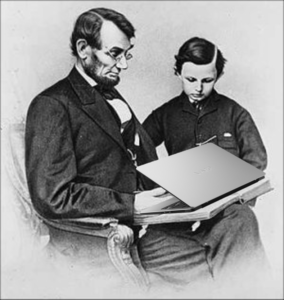Throughout my career, I have had the honor and privilege of leading several organizations. One of the principles I applied during my tenure in each position was the right of those under my supervision to disagree with or challenge anything we did. However, it was incumbent on those who voiced disapproval to also provide an alternative. I thought about this management approach when my wife responded to my last post by saying, “You were pretty hard on Facebook.” She was right. What was my solution for the 1.4 billion daily users whom I had urged to cancel their Facebook accounts?
 If you have not figured it out by now, many of my posts are grounded in analogies, comparing the sujet du jour (topic of the day) to a totally unrelated reference. Enter the 16th president of the United States Abraham Lincoln. If the 2016 election and its association with groups like Cambridge Analytica were the “Gettysburg of the on-line era,” how would Honest Abe have honored those who were swept up in this monumental battle between a desire to build a sense of community and the right to privacy. With apologies to the Great Emancipator…
If you have not figured it out by now, many of my posts are grounded in analogies, comparing the sujet du jour (topic of the day) to a totally unrelated reference. Enter the 16th president of the United States Abraham Lincoln. If the 2016 election and its association with groups like Cambridge Analytica were the “Gettysburg of the on-line era,” how would Honest Abe have honored those who were swept up in this monumental battle between a desire to build a sense of community and the right to privacy. With apologies to the Great Emancipator…
Eight score and 13 months ago, Harvard students brought forth a new computer program, conceived in their dormitory room, and dedicated to the proposition human beings need a forum on which they can expose and share every aspect of their lives which marketers and politicians will use against them to promote useless products and divisive discourse.
Now we are engaged in a conflict, testing whether that application, or any application so conceived and dedicated, can long endure.
The world will little note nor long remember what the pundits said about how so many individuals were “zuckered” into believing shareholders would put our collective appetite for community before their personal gain. It is for us, with the benefit of experience and hindsight, to be here, dedicated to the task remaining before us–a better application of the users, by the users and for the users.
Thus the proposed name “OurSpace,” an application not only populated by the users, but wholly owned and operated by those same individuals. Here is how it might work.
- OurSpace would be established as a 501(c)(6) non-profit corporation (similar to a chamber of commerce or professional association). All revenues would be used for administration of the program..
- There is no such thing as a free lunch. OurSpace would be funded with a one-time $10 membership fee. If it attracted just 10 percent of the current 2.1 billion Facebook accounts, this would generate a permanent capitalization totaling $2.1 billion. If invested with even a modest 3.0 percent return, the corpus would generate $63 million annually. This would be the application’s sole source of revenue. No paid advertising.
- Employees would be compensated based on a schedule commensurate with other non-profits. It could even use the federal GSA grade designations. In this case, even the CEO would be limited to a salary of $400,000/year equal to that of the president of the United States.
- The board of directors would consist of paid members and be representative of the user base.
- The board would establish criteria which governed what constituted acceptable material members could post to the site.
- A compliance review committee, again made up of paid members, would review cases where users may have violated the acceptable material criteria.
- Under no circumstances would user profiles or other information be shared with third parties.
All of the tools (e.g. crowd sourcing sites) to create OurSpace already exist. All that is missing is one or more individuals who have the commitment and energy to prove the ability to connect people on-line can be achieved without having to sell out the users. If only I were 20 years younger.
For what it’s worth.
Dr. ESP